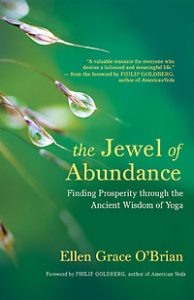A Grateful Generous Heart
 An excerpt from The Jewel of Abundance by Ellen Grace O’Brian
An excerpt from The Jewel of Abundance by Ellen Grace O’Brian
Although millions of Westerners practice yoga simply for its health benefits, the philosophy and wisdom behind the multifaceted discipline have far more to offer. In The Jewel of Abundance: Finding Prosperity through the Ancient Wisdom of Yoga, award-winning author and Kriya Yoga teacher Ellen Grace O’Brian reveals an overlooked aspect of yoga: its powerful teachings on prosperity. She draws upon the ancient Vedic tradition of yoga philosophy and practice and shows how spirituality and earthly success can complement each other, leading to realization of the higher Self. O’Brian presents a clear explanation of both the philosophy of yoga and the nuts and bolts of practice, such as setting up a daily meditation routine, incorporating mantras, discerning how to cooperate with universal principles for complete well-being, and cultivating mindfulness in action. We hope you’ll enjoy this excerpt from the book.
# # #
A grateful heart is a magnet that draws to us what is harmonious and good. This idea is reflected in a playful metaphysical adage: not, “We see things as they are,” but, “We see things as we are.” In other words, our state of mind and consciousness color our perception and determine how we see and experience things. Taken a step further, this dynamic explains how we also then draw to us what corresponds with our consciousness. When our hearts are grateful, when we approach others and life itself with gratitude for all that is given, we generally reap more of the same. The opposite is true as well. When we’re down and depressed and can’t see much good anywhere — that experience will tend to compound itself.
Life in the manifest realm is mixed — light and dark, hot and cold, day and night, up and down, fast and slow, and so on it goes. But beyond all duality and changing phenomena is the unchanging Absolute Reality that we can know as good, as whole and completely supportive of its divine purpose. Isn’t it better for us to call forth the good in every situation? To call it forth in every moment? We can do this through training our mind to extract what is good, what is praiseworthy or useful, and gratitude is one way to do that. Simply look deeply into any relationship, or any situation, and ask what there is to be grateful for. There is always something. When we find it, and call it forth, our heart opens and we become more receptive to the presence of divine grace at hand.
Which comes first, gratitude or grace? They seem to arise together. Gratitude is our natural response to the gift of grace, and gratitude itself opens us to the awareness of ever-present divine support. When we work hard toward something and accomplish it, or desire something and attain it, we generally feel good, and along with that we feel some relief — a kind of “job well done!” out-breath. A very different feeling arises when we become aware of the powerful presence of divine grace that has allowed us to experience more than we ever could have without divine support. On those occasions, we feel something else. We feel awe. We are amazed, inspired, and yes, grateful.
The distinction between relief and awe is a good indicator. It gives us a glimpse into how expansive our life is, how awesome it is or can be.
Gratitude Practice
Gratitude stretches us to be bigger, to expand our consciousness, to open our hearts and our minds more fully. When we begin the practice of cultivating gratitude, we often notice that it’s generally easier to feel grateful for what we like, for what we want or find pleasant. It’s more difficult to experience gratitude when what comes our way is unwanted.
I once worked with a woman who had an amazing gratitude practice. It was so pervasive that it was contagious. I found myself feeling grateful for her because her grateful attitude made our encounters so pleasant. Her responses frequently surprised me and helped me to expand my perspective. This was her practice: Whatever I offered her, she responded with a genuine “Thank you!” Her response was always the same. If I offered her my praise and gratitude for something she did well, she would thank me. If I let her know that she had made a mistake or that something was not done well or right, her response was still “Thank you!” This was the key that made this practice so effective. She was truly grateful, her words accompanied by a genuine smile. She never gave one of those “thank you” nods accompanied by a smirk. How did she do that? I never asked her, but my guess is that she was a natural at cultivating spiritual awakening through selfless service. She did what she did as an offering, as her way of worship. She was grateful when it went well, and she was grateful when it did not because that gave her an opportunity to learn.
Being able to say “thank you” to what comes, both pleasant and unpleasant, is unconditional gratitude. “Thank you” can be said aloud when appropriate, or silently as a prayer, but let’s say it! We can practice offering gratitude for something or someone that has pleased us and for something or someone that has not. The first is easy. The second, not so easy. It becomes easier as we hold that whatever comes into our life and experience always brings an opportunity for us. What will we do with that opportunity? When we meet it with gratitude, our potential to prosper and grow in love is multiplied.
# # #
 Ellen Grace O’Brian is the author of The Jewel of Abundance and director of the Center for Spiritual Enlightenment in San Jose, CA. Ellen is a yogacharya (an esteemed yoga teacher), a radio host, and an award-winning poet who weaves poetry into her teachings on spiritual matters, pointing to the mystical experience beyond words and thought. Ordained by a direct disciple of Paramahansa Yogananda, she has been teaching Kriya Yoga philosophy and practice nationally and internationally for over three decades. Visit her online at www.ellengraceobrian.com.
Ellen Grace O’Brian is the author of The Jewel of Abundance and director of the Center for Spiritual Enlightenment in San Jose, CA. Ellen is a yogacharya (an esteemed yoga teacher), a radio host, and an award-winning poet who weaves poetry into her teachings on spiritual matters, pointing to the mystical experience beyond words and thought. Ordained by a direct disciple of Paramahansa Yogananda, she has been teaching Kriya Yoga philosophy and practice nationally and internationally for over three decades. Visit her online at www.ellengraceobrian.com.
Excerpted from the book The Jewel of Abundance: Finding Prosperity through the Ancient Wisdom of Yoga. Copyright ©2018 by Ellen Grace O’Brian. Printed with permission from New World Library — www.newworldlibrary.com.









